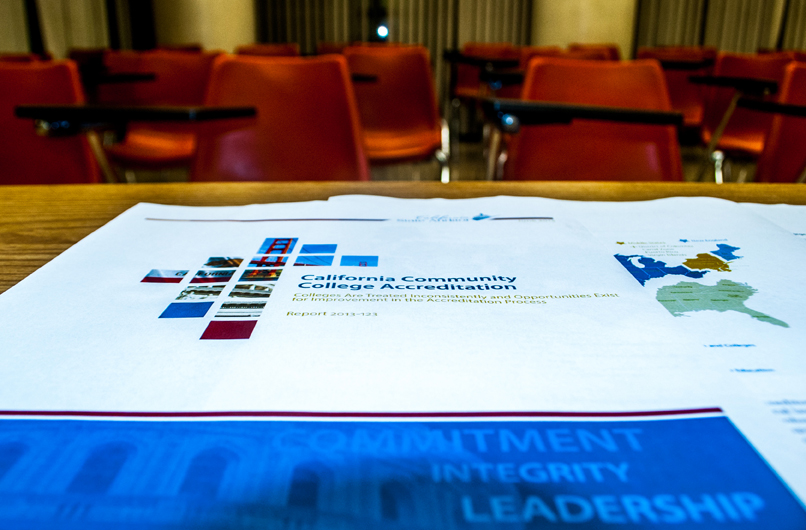Auditor’s report questions ACCJC authority

By Patrick Fitzgerald
The Guardsman
A Joint Legislative Audit Committee chaired by Assemblyman Adam Gray (D-Merced) found community colleges were treated inconsistently by the Accrediting Committee for Community and Junior Colleges (ACCJC) and urged the State Community College’s Chancellor Office to advocate for accreditation reform.
The report entitled “California Community College Accreditation” was published by the California State Auditor’s office in June 2014 and covers the January 2009 to January 2014 period. It substantiates a basis of inconsistent and unfair practices in the accreditation review process.
“The audit report in particular highlights many of the things that we had been saying about the ACCJC from the very beginning,” said Tim Killikelly, president of the American Federation of Teachers Local 2121. “The basic fact that we have been talking about in the trial is basic fairness.”
One inconsistent action specifically cited in the report was the ACCJC decision to terminate City College’s accreditation, even after Special Trustee Robert Agrella was appointed. Fifteen other institutions were given up to two years and another six were given up to five years to come into compliance.
Of the seven regional accrediting agencies in the nation, the California state audit report notes that the ACCJC sanctioned community colleges at the significantly higher rate of 53.2 percent compared to the next highest region’s rate of 24.3 percent. The ACCJC took action to terminate City College’s accreditation as of July 31, 2014, but was subsequently blocked by a temporary ruling issued by Judge Curtis Karnow on Feb. 16, 2015. This came after a lawsuit was filed by San Francisco City Attorney Dennis Herrera’s office.
“Is it a democratic process; is there input from both sides and a way to streamline their way out of their predicament,” student Micah Johnson said. “We need these educational institutions. You have to have a certain amount of firehouses, a certain number of police and when one of them is just gone, what are people supposed to do.”
Under oath at the City College accreditation trial, California Community Colleges Chancellor Brice Harris testified that City College graduates more students than the statewide average according to Student Success Scorecard survey. The scorecard puts City College’s completion rate at 56 percent versus 48.1 percent statewide and shows that the college did better in 10 of 13 metrics measured.
The audit report also points to problems with the lack of transparency in the ACCJC’s accreditation status proceedings. The report found fault with the appeals process for not allowing City College a definitive right to enter new evidence of progress in addressing deficiencies.
“This state audit was an important part of the volumes of evidence presented by the City Attorney of San Francisco, Dennis Herrera’s office to show that City College of San Francisco was treated differently from the way that other community colleges were treated,” retired CCSF instructor Jim McKinney said.
Further, the report said the California Community Colleges Chancellor’s Office (CCCCO) could do a better job in monitoring potential threats to all California community college’s accreditation thereby giving advanced warning to institutions of potential hazards. It urged that community colleges have options to choose their accreditors.
However, CCCCO stated in a letter dated June 10, 2014 that this option should not be pursued as such action would in itself cause greater inconsistency as not all rules and standards of accreditors are the same.
The findings of the report were submitted to CCCCO’s office, a state-run agency to better protect the interests of California community colleges. The ACCJC is recognized by U.S. Department of Education as a regional accreditor.
“There is no indication from the report that says any of the members of the team had the experience or competence to express opinions regarding matters of accreditation, matters that involve the decisions that ACCJC made that relate to CCSF, or about legal matters that involve federal law and regulations,” ACCJC President Barbara Beno said in a letter dated June 9, 2014. “For all these reasons, such comments in the audit should be viewed only as personal opinions of the team.”
City College’s issues with ACCJC puts the school at risk of losing not only its accreditation but also has caused it potential lost revenue from enrollment declines.
Meanwhile, Judge Karnow is due to make his ruling on the city attorney’s lawsuit before the end of January.
